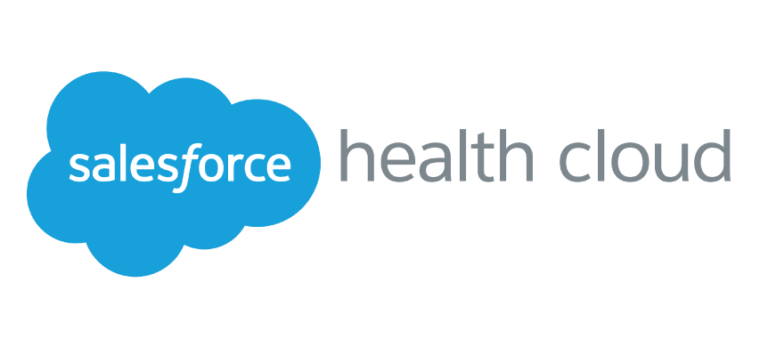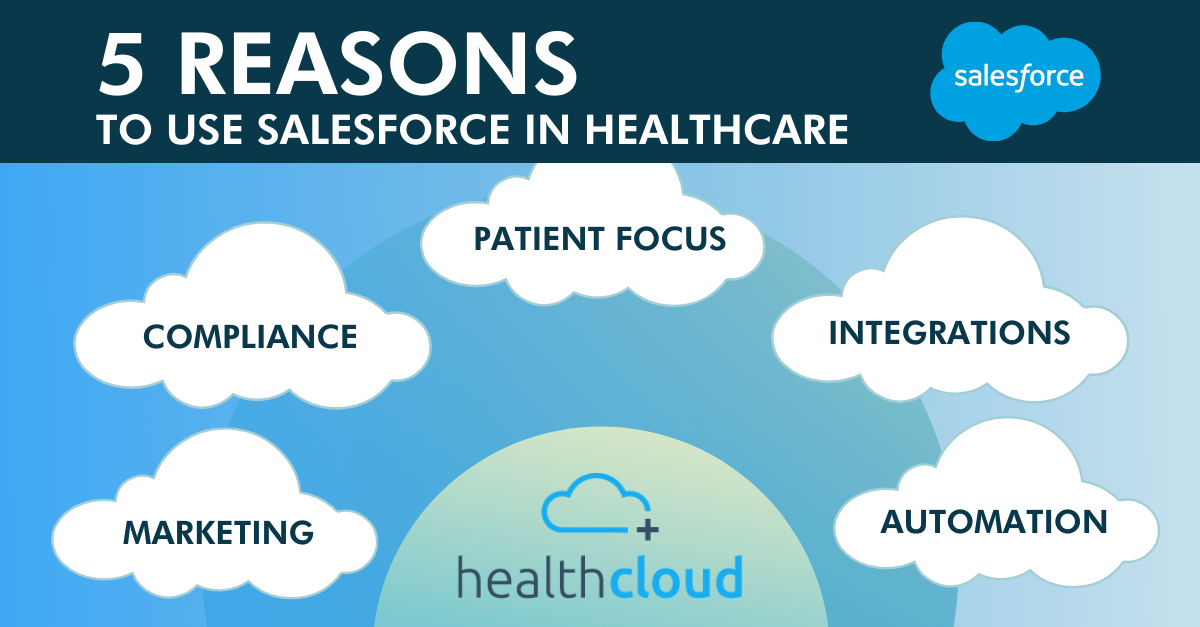Customer Relationship Management (CRM) systems worldwide have a proven track record of assisting organizations in exceeding sales targets. After all, sales are the primary focus of a CRM. But the ways Salesforce boosts sales through personalizing experiences, improving collaboration, and reducing data silos are relevant to more than simply sales.
Since the launch of Salesforce Health Cloud in 2016, the healthcare industry has recognized the value of a healthcare CRM. Salesforce enables care teams to collaborate more efficiently, and improve patient-provider interactions; resulting in better health outcomes. Salesforce’s ability to adapt quickly and accommodate a variety of healthcare use cases is further demonstrated by the Vaccine Cloud announcement.
With a 360-degree industry view and purpose-built solutions on a single platform, Salesforce provides tailored digital-first experiences at scale. It fosters even quicker innovation to remain ahead of the curve since it uses clicks rather than code. Below are 5 REASONS TO USE SALESFORCE IN HEALTHCARE.
1. Marketing
Salesforce leverages marketing automation to reach suitable patients so that commercial healthcare solutions can go to market faster. Marketers in the healthcare and life sciences industries must be able to reach out to patients on a large scale. Marketing departments in healthcare, however, have distinct obstacles. Data complexities and privacy concerns necessitate a solid platform and well-thought-out methods to conduct efficient campaigns.
Marketers, for example, can use Journey Builder to automate targeted cross-channel journeys without involving IT or third-party partners. Due to this, marketers will be able to engage patients at scale and own campaigns from strategy to execution. Salesforce Health Cloud as the core CRM and Salesforce Marketing Cloud as the marketing orchestration and execution engine are the two recommended Salesforce products for an integrated healthcare marketing platform.

Salesforce Health Cloud allows you to surface and aggregate fragmented patient data into a single platform, allowing for more tailored care to patients on a larger scale. However, harnessing such data to improve patient communication across marketing campaigns remains a considerable barrier without the correct marketing tools and processes.
Many marketing systems cannot handle the needs of healthcare marketing departments because of the large and sophisticated data models required. The versatile and scalable data structure of Salesforce Marketing Cloud, paired with its Health Cloud connectivity capabilities, allows teams to engage Patients on their terms, with material suited to their needs and preferences.
Of course, marketing segmentation and campaign execution come in all shapes and sizes. It requires developing a custom solution, outsourcing to an agency, or working closely with internal IT departments to drive marketing projects forward. When properly configured, Salesforce Marketing Cloud serves as a consolidated platform for marketers to identify target audiences, engage them with personalized content, and track progress toward marketing objectives. All of this across multiple channels.
The Madison Ave team can help you gain ground and optimize procedures by providing expert advice and expertise in today’s marketing technology. Marketing Cloud, Pardot, Hubspot, Marketo, Eloqua, and Google Analytics are all core components of our service offering.
2. Automation
Traditional healthcare data management systems, such as Electronic Health Records, place a significant strain on healthcare providers, such as doctors, nurses, and other medical personnel. According to researchers from Cerner Corporation, Doctors spent 16-minutes, on average entering data. Using Salesforce’s highly-customizable interface, organizations can automate much of that data entry, allowing providers to save that time and refocus on caring for their patients.
Salesforce Healthcare CRM alleviates the documentation burden by offering simpler patient data management and analytic options. The CRM revolutionizes the patient care process by allowing healthcare professionals to spend more time physically caring for their patients without jeopardizing the documentation of their care.

Providers can use Health Cloud with numerous automation solutions to streamline and optimize operations, communications, and patient care. The “Today” screen identifies and filters the most pressing patient issues that need to be addressed right now, such as medication refills or follow-up appointments. Providers can see vital tasks for the whole patient population at a glance, ensuring that necessary care actions don’t get overlooked. Health Cloud also includes capabilities for segmenting and monitoring patient populations and conducting and tracking patient communications and outreach initiatives.
You may suddenly be dealing with a considerably higher influx of patients as more Americans become dependent on healthcare institutions to the point where they frequently visit them. Unfortunately, this means you will have to accommodate patients with less patience (as great as having more consumers to deal with) and more time limitations when servicing your clients. Thankfully, Salesforce can help you improve your information access experiences to eliminate lineups and offset the challenges of dealing with significantly higher workloads and busy days!
Today, more businesses from all sectors are attempting to strengthen their interactions with those they supply goods and services. The quality, relevance, and timeliness of information flow between providers and consumers is the lifeblood of the exchange; it is the decisive factor in the provider organization’s healthy functioning.
This guideline is very prevalent in the healthcare industry. Healthcare providers need a well-designed and efficient solution built around a robust and healthcare-specific CRM coupled with marketing, analytics, clinical decision support, and the ability to automate tasks and workflows at multiple levels.
3. Compliance
The platform allows the client to access critical patient data, such as medical history, medications, diagnosis, insurance, and underlying conditions.
Data security is vital to the platform’s success. Salesforce has made significant investments in infrastructure to ensure that health data is exchanged between hospitals, physicians’ offices, retail pharmacies, and patients securely. Third-party audits, such as The Health Insurance Portability and Accountability Act (HIPAA) compliance, give additional security.
The COVID-19 pandemic is putting a strain on the healthcare community, consuming public health knowledge, medical research capacity, hospital resources, and equipment availability. Hospitals in the United States deal with enormous waves of sick patients who require a variety of medical services and routine surgeries. Meanwhile, regulations such as the Federal Risk and Management Program (FedRAMP) and HIPAA require compliance. Fortunately, hospitals and government agencies can use IT fully compliant salesforce solutions created to assist them in getting through the crisis.
4. Integrations
Not ready to replace your EHR system? Salesforce’s robust APIs (Application Programming Interface) allow multiple systems to integrate. It aims to bring patient data from electronic health records, medical devices, and wearables together on a single platform. You’ll be able to store, access, and view all patient forms in one location with Health Cloud, making data management more accessible and more streamlined.
Salesforce Health Cloud extends Service Cloud’s capabilities by allowing healthcare practitioners to form Care Teams composed of patients’ care community members. Primary care physicians, specialists, household caregivers, and anybody involved in a patient’s healthcare journey could make up this group. Individuals may examine a single care management plan, assign tasks, and send messages back and forth from any device. Other Service Cloud tools, such as Knowledge, Case Teams, and Live Agent, are also available.
Care teams encourage collaboration and productivity to keep their patients happy and healthy. They’re a win-win situation for doctors and patients, setting a precedent in Salesforce and healthcare.
5. Patient Focus
Salesforce provides a 360-degree perspective of your patients, allowing you to understand their requirements better and prioritize their care. With safe, connected, and intelligent health apps, the platform enables a rich patient experience. It also allows patients to access their medical history from any mobile device.
It assists you in creating a stable and secure environment for both patients and healthcare workers. It aids your attempts to improve healthcare delivery by offering you tools for generating individualized patient experiences and technologies that allow customers to connect in real-time. Salesforce Health Cloud enables you to provide patients and healthcare providers with a consistent experience. It will enable you to deliver targeted care through individualized communication, allowing personnel to tailor their services to specific areas of concern.

Salesforce Health Cloud patients will receive more innovative, tailored, and ubiquitous care from Care Teams across many channels. Care Teams may connect and cooperate on patient care with better visibility into patient case-specific information, ensuring a higher degree of trust and engagement with their patients.
Experts at Madison Ave Consulting will assist you in establishing a lasting and effective relationship with your customers. If you want to simplify your process of creating a bond with your customers for improved sales and services, then be sure to get in touch with us today for a consultation!
